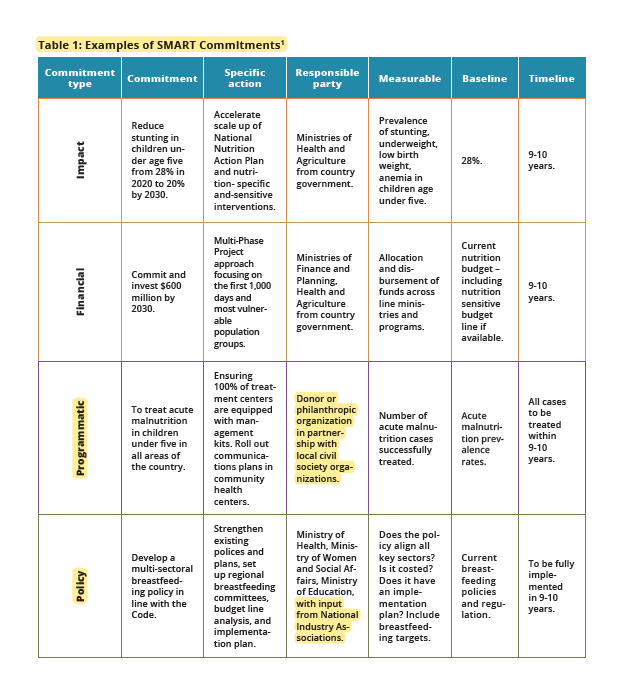Why the Nutrition for Growth (N4G) global pledging initiative is a threat to child health
– how industry infiltrates the baby food policy space.
“At a time when poverty rates, economic disparity, conflicts and hunger are rising, N4G promotes short term treatment models again, with little attempt to create real sustainable changes in food systems. The N4G fails to recognise that the agro-industrial model bears much of the blame for the climate crisis and poor diets. Its reliance on market-led approaches and export-oriented trade of ultra-processed products inevitably leads to increased deforestation, land-grabbing, mono-cropping etc.

Table 1: Examples of SMART Commitments.
The Responsible Party for Programmes is: Donor or philanthropic organization in partnership with local civil society organizations.
We are grateful to WHO, UNICEF and others for persuading the Government of Japan to exclude individual companies from the event. However, food Business Associations will be invited including those who represent and lobby for companies that market products covered by the code (breastmilk substitutes, complementary foods, ingredients, feeding equipment, milks for mothers, food supplements, therapeutic or other products marketed in ways that undermine breastfeeding etc. )
There is no mention of how these companies undermine health and the environment by promoting the consumption of ultra-processed high sugar/salt foods. (1,2) Civil society’s role is confined to being a partner to Donors in the implementation.
The intention is clearly to blur the identities of corporate members while increasing their influence in the shaping of and implementation of national policies. This would be dangerous for all food sectors but in the Infant and Young Child Feeding arena it is disastrous.
This would cover the marketing of foods for infants and young children, including the high-sugar Ready to Use Therapeutic Foods (RUTFs) and supplements. IBFAN is not saying that the products are never useful – they can be important if there is no other option. However it is critically important that their use and distribution is not commercially influenced. We know that the baby food industry is eager to partner with humanitarian agencies to deliver them and IBFAN is working to ensure that they are not sold on the open market or promoted with claims or other methods.
We can only conclude that fundraising is N4G’s secondary motive. The main one is to provide image transfer opportunities for food industry associations so that they can sit by the side with the governments when nutrition policies are made – this is a long-term financial benefit to industry worth far more than any donation.
Interesting that on a global level the International Special Dietary Foods Association (ISDI) that represents the baby food industry in 20 countries lost its Official Relations status with WHO in 2013
- promotes nutrition approaches that favor short-term medicalized and technical solutions;
- promotes intensive agriculture and technologies such as biofortification that benefit food and agro-industry;
- neglects the commerciogenic causes of malnutrition (under and over nutrition) and its focus on market-led approaches to food fortification can undermine confidence in breastfeeding and sustainable, culturally appropriate local foods;
- has limited impact on reducing malnutrition through its interventions, while carrying negative implications for human rights;
- enhanced private sector access to and influence on nutrition policy setting in line with the World Economic Forum’s model outlined in its Global Redesign Initiative;
- attempts to generate the illusion of a broad and inclusive people’s ‘movement’ but is in fact a public-private hybrid which legitimizes more corporate influence in public affairs;
- fails to meaningfully address the concerns of communities most affected by hunger and malnutrition and undermines the efforts of those calling for effective conflict of interest regulations.
- IBFAN expects that baby food industry will use very weak Para 3.5.1.d of the CFS Voluntary Guidelines on Food Food Systems and Nutrition (VGFSyN) as an ‘entry ticket’ to many of these initiatives. This paragraph fails to refer to the Resolutions or the need for regulations. It also calls on everything to be ‘”in line with [existing] national legislations”, so undermining the need for new or stronger laws. SUN and N4G are both footnoted in the VGFSyN Guidelines. The Civil Society and indigenous People’s Mechanism has decided to reject the guidelines.
- Harmful businesses will benefit in many ways through their association with the UN, N4G and the relief of hunger. As GAIN’s Director, Lawrence Haddad described in his global appeal for food industry funding: “The benefit to corporates would be threefold, say those behind the fund. Firstly, contributing firms would be more attractive to the growing band of Environmental, Social and Governance (ESG) investors. Second, it would increase the bottom line – studies show that strong corporate social responsibility adds to return on assets after the first two to three years. Third, it would give employees a greater sense of purpose. Younger employees in particular are looking to reward companies that display a greater sense of social mission. They are looking for increased meaning in their work.”
IBFAN is appealing to everyone involved in maternal and child health to be aware of these often overlooked risks and not to promote these initiatives.
